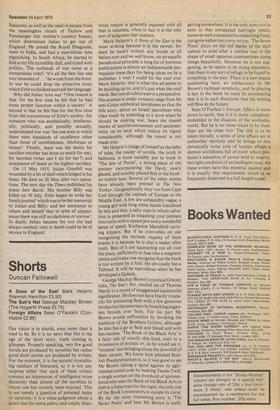Shorts
Duncan Fallowell A Dove of the East Mark Helprin (Hamish Hamilton £3.50) The Sun's Net George Mackay Brown (The Hogarth Press £3.75) Foreign Affairs Sean O'Faolain (Constable £2.95)
Our vision is in shards, even more than it used to be. So it is no news that this is the age of the short story, truth coming in glimpses. Properly speaking, very few good novels are produced by novelists but rather good short stories are produced by writers. For the moment, it is the natural crystallising medium of literature, so it is not any surprise either that each of these writers conveys an impression of intelligence more decisively than almost all the novelists to Whom one has recently been exposed. This is not merely a question of personal tastes or opinions; it is a value-judgment about a genre that for some paltry and totally disas
trous reason is generally equated with all that is valueless, when in fact it is the only sort of judgment that matters.
Mark Helprin's A Dove of the East is the most striking because it is the newest. Indeed he hasn't written any books at all before now and we well know, on an equally paradoxical principle, a long list of previous publications is almost an indispensable prerequisite these days for being taken on by a publisher. I wish 1 could hit the roof over Mark Helprin: that is what this all seems to be building up to, and it's just what the roof needs. But one should preserve a perspective. His acumen is under constant siege from his anti-Golan rabbinical Jewishness so that the title story, about an Israeli patrolman who risks much by attending to a dove when he should be making war, bears the thumb marks of sanctimoniousness and sentimentality on its neck which reduce its vigour considerably, although the moral is not made trite.
Mr Helprin's image of himself as the teller of tales, the reader of scrolls, the prick in balloons, is more suitably put to work in 'The Jew of Persia', a strong piece of old pottery incorporating the Devil, newly glazed, and sensibly placed first in the book : no hubris here. Several of the other stories have already been printed in The New Yorker. Geographically they run from Cape Cod through the capitals of Europe to the Middle East. A few are unbeatably vague, a young girl with long white hands transfixed by this and that, a salty man in whom salvation is presented as smashing your pinnace into rocks with a square jaw and a wonderful sense of speed, Katherine Mansfield carrying kippers. But if he over-relies on our recognising the intrinsic majesty of these events it is because he is also a seeker after truth. Bits of it are squittering out all over the place, sufficiently to fuse into a magnetic centre and make one recognise that the book is not written by a fool. He obviously has a Talmud. It will be marvellous when he has developed a Qabala.
George Mackay Brown's mystical Orkney tales, The Sun's Net, remind me of Thomas Hardy in a mood of exaggerated equinoctial significance. He does not have Hardy's capacity for animating flesh with a few generous strokes but thesame heavily breathing paganism broods over both. For his part Mr Brown avoids suffocation by invoking the tradition of the Brothers Grimm, although he also has a go at flesh and blood and with less success. 'The Book of the Black Arts' is a fairy tale of exactly this kind, even to a procession of archaic or, as he would see it, 'timeless' sins bringing about the downfall of their owners. We know how pinched Scottish Presbyterianism is, so it was good to see Mr Brown taking a strand against its uglyminded moral code by making Teenie Twill, a single woman on the threshold of spinsterhood who uses the Book of the Black Arts to pull in a fisherman for the night, the only one of the Book's possessors.to escape its curse. By far the most interesting story is 'The Seven Poets' and here Mr Brown is really
getting somewhere. It is the only story not to exist in that antiquated half-light which, however well-connected its underlying force, can grow rather too corny on top. 'The Seven Poets' plays on the old theme of the idyll culture to arise after a nuclear war in the shape of small agrarian communities doing things beautifully. However he is not suggesting, as he seems to be doing elsewhere, that there is any sort of refuge to be found by crouching in the past. There is a new breeze quickening here, an exhilaration in Mr Brown's habitual simplicity, and by placing it last in the book he must be announcing that it is in such directions that his writing will flow in the future.
Sean O'Faolain's Foreign Affairs is more down to earth, that is it is more completely embedded in the illusions of the workaday world. But he is no more taken in by them than are the other two. The title is to be taken literally, a series of love affairs set in unfamiliar territory and he brings to this chronically noisy area of human affairs a shrewd worldliness full of event which produces a sensation of power held in reserve, the right condition of an intelligent man. All these writers have this essential quality and it is exactly this requirement which is so frequently dispersed in a full-length novel.


































 Previous page
Previous page